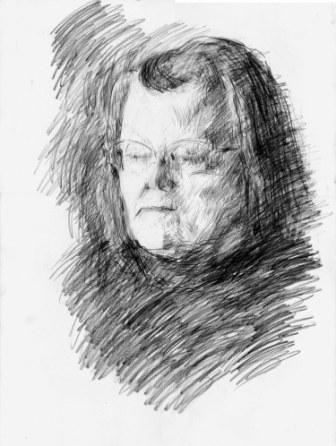The period of my childhood that comes back to me most vividly and in more detail is from six to eight years old. So many parts of me came alive then: memory, imagination, mysticism. When I told the members of our writers’ group this, one of the women said that the memoir she is writing about her uncle’s farm is from that age too.
During that period my father got a better paying, exciting job. I had my tonsils out. My grandfather died. The war started. I discovered the pleasure of roaming in the woods. I learned to tie my shoes. During that period too, we went tenting with friends in the White Mountains, on the Mad River.
I was seven and a half when the war started, and it affected my family only in a positive way. Several of the artists in the art room of the Boston Globe were drafted, and my father was able to get a job replacing one of them. Because he was 31 and had two children, he was classified one A only near the end of the war. My uncles were drafted, friends of the family were, but that meant only that when they came home on leave, my brother and I got to wear their uniform jackets and hats and get our photographs taken. I wrote to my uncle, and he sent letters and presents from the Pacific islands.
I remember being given ether and ice cream when I had my tonsils out but remember little else of the experience. What I do remember is sitting on the front porch of the house we were living in at the time and my father coming home with surprises. He had received his first paycheck from the Globe and gone out to buy us treats. I don’t remember what he bought me or Robin, but I can recall in great detail what he bought my mother: two red plaid skirts and a red dress with a black velvet bib top. Looking back on it, I think that my mother must have been disappointed not to be able to pick out the clothes herself. She said to me, “Isn’t that just like your father, to buy two red plaid skirts.” Three years later she had a serious operation, and she expressed a desire for plant pots. For Christmas my father bought perhaps 20 plant pots, of all descriptions. One was in the form of a woman’s shoe; one was a woman’s hand with red polish on the fingernails. I remember that that even at the time I realized these were not at all to her taste. She liked antiques, she liked rose, not red.
Subscribe to:
Post Comments (Atom)

No comments:
Post a Comment